
Tell us what you need to find a matching loft conversion specialist

Get free quotes from professionals near you

Compare offers and choose the one that best matches your need
- Householdquotes.co.uk
- Driveway
- Driveway Materials
Pros and Cons of Leading Driveway Materials


- When selecting a driveway material, consider your budget, desired level of maintenance, local climate, and accessibility for mobility aids.
- Asphalt is the most popular driveway material in the UK, and 95% of the roads are made of it.
- The most budget-friendly driveway material is gravel, which is the cheapest material and has the most affordable labour costs.
- The most durable material available is concrete, capable of supporting excessive traffic and heavy vehicles.
Choosing a suitable driveway material is crucial when enhancing your home's curb appeal. Your driveway not only provides a functional space for parking but also serves as a prominent design element. With a variety of driveway materials and types available, it can be overwhelming to make a decision.
This comprehensive guide will walk you through the driveway cost, the materials, their characteristics, and the factors to consider when choosing the right one for your home.
Whether you prefer the classic elegance of concrete or the rustic charm of gravel, we've got you covered. You'll discover the pros and cons of each material, their durability and maintenance requirements, and the overall aesthetic they can bring to your property.
We'll also explore the different types of driveways, such as poured concrete, asphalt, block pavers and more, providing insights into their suitability for various climates and budgets. By the end of this guide, you will clearly understand the different driveway materials and types available, empowering you to make an informed choice that aligns with your style preferences, budget, and long-term needs.
If you're feeling daunted by the many options for a new driveway, worry not! Household Quotes is here to offer you four complimentary quotes from local driveway specialists, customized to meet your specific needs.
Don't hesitate - complete our quick 30-second form below to receive your quotes now.
- Describe your needs
- Get free quotes
- Choose the best offer
It only takes 30 seconds

Which driveway materials should you choose?
When selecting a suitable driveway material for your home, several important factors must be considered to ensure you make an informed decision that aligns with your style preferences, budget, and long-term needs.
- Durability: One of the most important factors to consider is the durability of the driveway material. You want a material that can withstand heavy vehicles, harsh weather conditions, and regular use without showing signs of wear and tear.
- Maintenance: Consider the maintenance requirements of the driveway material. Some types of driveways may need regular sealing or repaving, while others may only require occasional cleaning. Think about the time and effort you are willing to invest in maintaining your driveway.
- Aesthetic appeal: Your driveway is an important design element that contributes to your home's overall curb appeal. Consider the aesthetic appeal of different materials and how they will complement your home's architectural style.
- Budget: Your budget will also significantly determine the type of driveway material you choose. Some types of driveways may be more expensive upfront but require less maintenance over time, while others may be more affordable but require regular upkeep.
- Climate: Take into account the climate in your area. Some driveway materials may be better suited for extreme heat or cold. In contrast, others may deteriorate quickly in certain weather conditions. Choose a material that can withstand the elements in your region.
- Accessibility: If you or a family member has mobility issues, it's crucial to consider accessibility and ease of movement when choosing driveway materials. Some types of driveways, such as gravel or cobblestone, can impede movement, while concrete or tarmac, with their smooth surfaces, are among the most accessible options.
What are the different types of driveways?
There are many different types of driveways in the UK. We have compiled a list of the most popular driveway materials and types in the UK, starting with the most common to the least:
- Asphalt and Tarmac
- Block Paving
- Concrete
- Gravel (crushed stone)
- Resin (bound or bonded)
- Bricks
- Indian Stone
- Cobblestone
In this section, we will discuss the pros and cons of each driveway material in detail to help you decide on the type of driveway best suited to your needs and preferences.
Asphalt or Tarmac

95% of roads in the UK are constructed from either tarmac or asphalt, according to Michal Golos of Tensar, and there are good reasons for their enduring popularity. Homeowners favour these types of driveways due to their cost-effectiveness and resilience. While they share similarities, they are produced differently, resulting in varying effects, advantages, and disadvantages for your driveway.
Asphalt is made by mixing aggregates like sand, gravel, or crushed stone, which are then bound together with bitumen, a derivative of crude oil. Tarmac, on the other hand, is a blend of the same aggregates, but they are bound together with tar, a by-product of coal.
It is essential to note the differences between these two driveway materials. The more knowledge you have, the better decision you can make for your new driveway:
- Asphalt is considered more durable, with a lifespan of 20 to 30 years compared to tarmac, which has a lifespan of 15 to 20 years.
- Tarmac is more prone to damage from pollutants such as oil spills. As an impermeable driveway material, these pollutants can run off and affect wildlife and water supplies.
- You can choose from a variety of asphalt driveways, such as porous asphalt, which allows water to drain through the driveway; stamped asphalt, which will enable you to customise your driveway; and cool-mix asphalt, which is a more sustainable and eco-friendly choice than the standard hot-mix asphalt.
- Tarmac, on the other hand, offers only red and black colours, so customisation is limited.
- Asphalt can be scraped and reused for other projects, whereas this is not possible with tarmac.
Both tarmac and asphalt are non-porous driveway materials, meaning that without a proper drainage system, your driveway can flood during heavy rain, causing damage to your cars and your home. However, there is now porous asphalt available that allows water to seep through your driveway. If you are looking for a budget-friendly, permeable material, then a porous asphalt driveway may be a great choice for you.
The downside of asphalt and tarmac driveways is the impact harsh weather conditions can have on them. While the UK is not known for its extreme weather, the effects of climate change are causing our summers to get hotter and our winters to get wetter and colder.
Hot weather can cause the colour of asphalt and tarmac to fade over time, leaving a worn-out and old-looking driveway. Furthermore, extreme heat can cause cracking and tracking. Tracking occurs when the surface of your driveway material becomes soft, making it prone to indents such as tyre marks. Cracking is when heat causes the binders of your asphalt or tarmac driveways to weaken, resulting in cracks within your driveway.
Extreme cold can also affect these driveway materials. Water that enters cracks in your driveway can expand during a freeze cycle, bursting apart the material and lengthening cracks.
Applying sealant to your asphalt or tarmac driveway every 2 to 3 years is vital to protect it from extreme weather conditions. The sealant also increases your driveway's longevity, meaning that it is cost-effective in the long run.
Despite having to reapply sealant on these driveway materials, they are still considered one of the most low-maintenance driveways available. Due to their bonding materials, weeds cannot grow through your driveway. Cleaning these driveways is simple. By using water, you can remove any debris or stains and keep your driveway looking fresh and new.
These driveway materials are praised for their quick installation and budget-friendly costs. On average, as they are easy to install, asphalt and tarmac driveways take about one day to install for a 30m2 driveway and cost roughly £60.00 per square metre.
Tarmac and asphalt driveways are ideal for individuals with mobility issues because they offer a smooth and even surface. This makes it easier for people using mobility aids such as wheelchairs, walkers, or mobility scooters to move around without encountering bumps or uneven terrain.
- Cost-effective
- Durable
- Easy to install
- Susceptible to heat
- Susceptible to freeze-thaw cycles
- Damaging to the environment
Block Paving
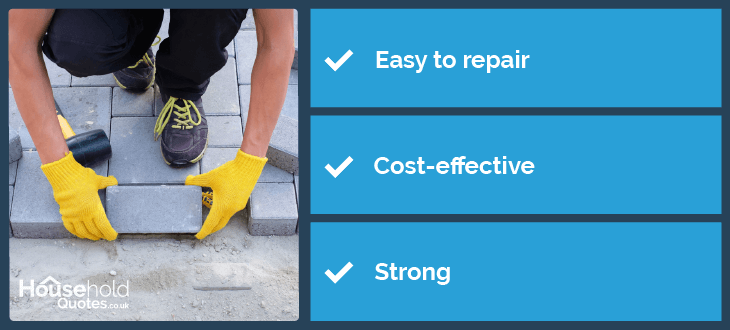
Block paving driveways or slab paving are made using individual blocks and laid in a specific pattern on a prepared base. These blocks are typically made from clay, concrete, or natural stone. Here are some key features and considerations regarding block paving driveways:
- Versatile: Block paving driveways offer various design options, including various colours, shapes, and patterns. This versatility allows you to create customised designs that complement your property’s aesthetic.
- Durable: When installed correctly, block paving driveways are durable and can withstand heavy loads, making them suitable for driveways subjected to frequent vehicular traffic. By resealing your block paving every two years you can expect your driveway to last between 20 to 25 years.
- Permeable: Block paving systems allow water to permeate through the surface, reducing surface.
- Easy to repair: In case of damage, individual blocks can be easily replaced without redoing the entire driveway. This makes maintenance and repairs more straightforward compared to other types of driveways.
Overall, block paving driveways offer a visually appealing, durable, and customizable option for homeowners looking to enhance the appearance and functionality of their driveways. However, it's essential to consider factors such as maintenance requirements, drainage considerations, and budget when deciding if block paving is the right choice for your property.
Block paving driveways offer many benefits, but they also have some disadvantages to consider:
- Cost: Block paving driveways can be more expensive than other driveway options, such as asphalt or gravel. This is due to the cost of materials and the labour-intensive installation process, especially if intricate designs or patterns are desired. On average, you can expect to pay between £20 to £60 per square metre just for the materials.
- Maintenance: Although individual blocks can be replaced if damaged, block paving driveways may require more frequent maintenance than solid surface options such as asphalt or concrete. Weeds can grow between the blocks, necessitating regular weeding or the use of weed killers. Moreover, the blocks may settle or shift over time, requiring re-leveling or re-sanding to maintain an even surface.
- Susceptibility to movement: While durable, block paving may be susceptible to movement over time, especially in areas with heavy vehicular traffic or where the ground is prone to shifting or settling. This movement can result in uneven surfaces, necessitating maintenance to rectify.
- Staining: Porous materials used in some block paving driveways may stain from oil leaks, grease, or other substances. Regular cleaning and sealing are necessary to prevent staining and maintain the driveway’s appearance.
- Slippery: While the textured surface of block paving can provide traction, it may become slippery when wet, especially if moss or algae are present. Additionally, during colder months, snow and ice can increase the likelihood of slipping, which can pose a risk of falls and injuries.
- Weed growth: If not properly maintained, the joints between blocks can provide opportunities for weed growth. Weeds can detract from the driveway’s appearance and require ongoing attention to keep under control.
Considering these disadvantages alongside the benefits can help you make informed decisions about whether block paving is the right choice for their driveway needs.
Concrete
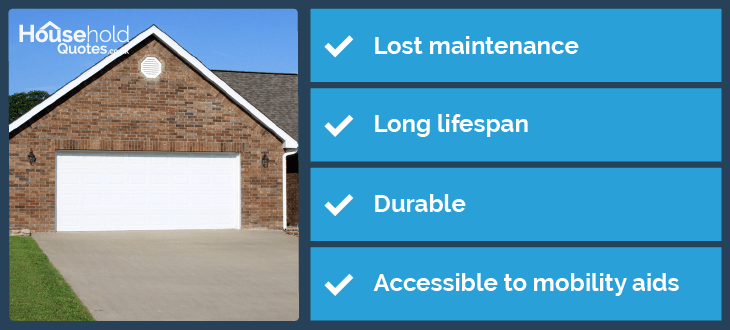
Concrete driveways are a durable and versatile option that offer a wide range of design possibilities. They are made from cement, sand, gravel, and water. There are two main types of concrete driveway materials available:
- Poured concrete: This is the most common type of concrete driveway, where a single slab of concrete is poured onto your driveway. It is the most cost-effective option, ranging from £18 to £25 per square metre and offers a sleek, modern feel to your driveway.
- Stamped concrete: Stamped concrete driveways are created by pressing patterns or textures into the surface of the concrete while it is still wet. This allows for a wide range of design options, including patterns that mimic brick, stone, tile, or other materials. Stamped concrete driveways can enhance a property's aesthetic appeal and are available in various colours and textures. The average cost of stamped concrete ranges from £27 to £32 per square metre.
There are many advantages in selecting concrete for your driveway material; below, we provide you with all the need-to-know about the benefits of concrete.
- Low maintenance: Once correctly installed, concrete driveways require minimal maintenance compared to other materials like asphalt or gravel. Regular cleaning and occasional sealing every 2 to 5 years is all that is needed to keep them in good condition.
- Durability: Concrete is renowned for its strength and durability. It can withhold heavy loads, such as vehicles, without cracking or deteriorating, making it considered one of the most robust driveway materials available.
- Longevity: Through proper installation and maintenance, concrete driveways can last up to 20 to 30 years.
- Accessibility: Concrete is an amazingly accessible driveway material, especially if you opt for flat-poured concrete. Its smooth surface provides easy access for those using mobility aids.
Concrete is excellent for those of you looking for a low-maintenance driveway yet there are a few downsides to choosing this driveway material that you should consider before proceeding with a concrete driveway.
- Susceptible to heat: Concrete driveways can shrink or crack in the sun as the high temperatures pull moisture out of the concrete. Furthermore, if exposed to heat, the colour of concrete can fade, leaving you with a worn-out driveway.
- Non-porous: While concrete is considered naturally porous when installed as a driveway, it does not provide sufficient drainage, which causes water pooling and even flooding. Therefore, additional drainage systems are required.
- Cracking: Concrete driveways can crack during colder temperatures if the water within a concrete slab becomes ice and expands.
- Cannot be repaired: Once a section of your concrete driveway is damaged, you will need to replace the entire thing.
- Staining: Concrete driveways are susceptible to staining from oil, grease, rust, and other substances. Sealing the driveway can help prevent staining but may require periodic cleaning and maintenance.
- Environmental Impact: The production of concrete involves significant energy consumption and carbon emissions, contributing to environmental concerns.
Concrete driveways offer durability, low maintenance, and versatility, making them a popular choice for homeowners. However, it's essential to weigh the pros and cons carefully and consider factors such as budget, climate, and aesthetic preferences before deciding.
Gravel
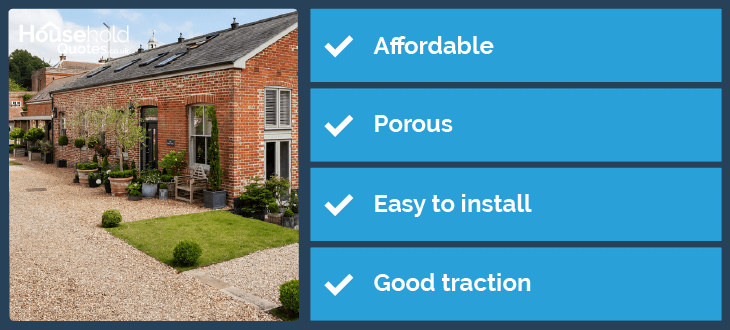
Gravel is an affordable and low-maintenance driveway material that can create a charming and inviting entrance to your home. It is relatively easy to install and can be customised to suit your preferences. Gravel driveways come in various colours and sizes, allowing you to create a unique and personalised driveway.
Crushed stone is the cheapest driveway material available. It is made of coarse sand and small stones, providing a unique look to your driveway. On the other hand, pea gravel is known for its smooth, small, round appearance. It is the smallest gravel driveway material available and is valued for its aesthetic appeal and smooth texture. Below, we go into further details of the advantages of a gravel driveway.
- Affordable: Gravel driveways are known for their excellent affordability, and is the cheapest driveway material. On average, a small driveway of about 30m2 will expect to pay between £1,050 to £1,650
- Versatile: Although gravel is budget-friendly, it does not mean that it is boring. The versatility of this driveway material produces an aesthetically pleasing look for any home, as it can be customised in terms of colour, size, and texture to complement the surrounding landscape or achieve a specific aesthetic.
- Good Drainage: Gravel provides excellent drainage properties, allowing rainwater to percolate through the surface and preventing puddles or standing water, making it one of the best driveway material for drainage. This makes it ideal for areas prone to heavy rainfall or flooding.
- Easy to install: Gravel can be relatively easy to install, especially for smaller projects. It typically requires minimal preparation compared to concrete or asphalt, reducing labour and installation costs.
- Provides good traction: Living in a wet climate or on a hill can make it difficult for cars to get good traction. Gravel driveways help by providing friction between the car's tyres and the driveway's surface, making driving easier in these conditions.
Another key advantage to gravel driveways is their lifespan, by resealing this driveway material every two to three years they can last up to 100 years.
However, a downside to gravel is that regular maintenance is required to keep it looking fresh, as the small stones tend to move around, potentially creating potholes and weed growth. To prevent weed growth, installing weed barriers before laying down your gravel driveway is recommended, which will lower the maintenance required.
While they provide good traction in wet climates, they are not aesthetically pleasing. Constant rain can muddy your driveway, leaving it grubby and worn out.
Additionally, the gravel's uneven surface makes it difficult for people using mobility aids to navigate the driveway. Compared to smoother surfaces like tarmac or concrete, gravel causes more friction and requires more effort to push through.
Resin (Bound or Bonded)

Resin driveways have recently become popular in the UK due to their durability and low maintenance. Two types of resin driveway materials are available in the UK: resin bound and resin bonded. Here are the differences between the two:
Resin Bound is a permeable material that provides excellent drainage and prevents water from pooling. It is made by mixing aggregates with resin, producing a smooth finish with no loose gravel.
The smooth finish makes it resistant to cracking, and has an estimated lifespan of 25 years. It is low maintenance driveway, requiring only an occasional sweep or wash to keep it clean.
Additionally, it provides excellent grip and is anti-slip, making it perfect for people with mobility aids or mobility issues.
Resin bonded driveways are created by applying a thin coat of resin before adding aggregates, leaving a rougher finish than resin bound driveways. They also provide excellent grip and are very low maintenance. The downside of resin bonded driveways is that they are not permeable, so a drainage system is required to prevent flooding and water pooling on the surface.
It is recommended to reseal your resin driveway every 2 to 3 years to prevent damage and increase its longevity.
A disadvantage of resin driveways is their cost, as they are considered one of the most expensive driveway materials available in the UK.
On average, a 30m2 driveway costs between £1,800 and £ 3,000, with the price increasing for larger driveways.
While resin is a durable driveway material, it weakens over time due to excess usage, leading to cracks or even lifting of the resin.
If you have heavy vehicles or expect much traffic on your driveway over the years, resin may not be an ideal fit for you. Additionally, repairing resin driveways is almost as expensive as installing them.
Bricks
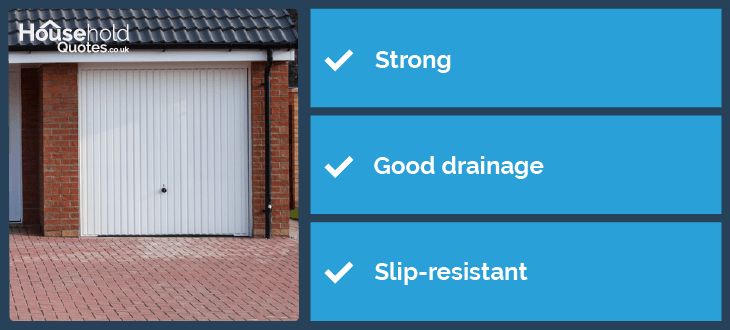
Brick driveways offer a natural and beautiful look to any home. They are similar to block paving, but the key difference is that they are made using natural clay, making them more sustainable and naturally porous.
This makes them a popular choice for driveways in the UK. With proper upkeep and a sealant applied every 2 to 3 years, a brick driveway can last about 25 years.
Their texture makes them naturally slip-resistant and safe for areas prone to ice, snow, or heavy rain. Additionally the texture of the brick material provides excellent grip for those with mobility aids, making them a tremendously accessible option.
Due to their porous nature, brick driveways provide natural drainage, reducing the risk of flooding and eliminating the need for extra drainage systems in your driveway.
Furthermore, brick driveways can withstand heavy weight, making them ideal for those who use heavy vehicles or have a driveway with heavy usage. They are also easy to repair, as sections can be removed without affecting the driveway.
However, brick driveways have downsides in terms of cost and maintenance. While not as expensive as resin driveways, they are still quite considerable compared to gravel or asphalt.
On average, you can expect to pay around £1,200 to £1,800 for a 30m2 driveway. Furthermore, the gaps between this driveway material can be a nuisance to clean and allow weeds to grow. However, weed barriers can help deter their growth.
Brick driveways are also susceptible to staining from oil, grease, rust, and other substances, and spills should be cleaned up promptly to prevent permanent staining.
Additionally, some sealants used on brick driveways may darken or discolour the bricks over time, affecting the driveway's appearance.
While they provide a natural, eco-friendly, porous driveway, you must be prepared for upkeep on brick driveways. Failing to do so can result in a grown-out and grubby-looking driveway.
Indian Stone
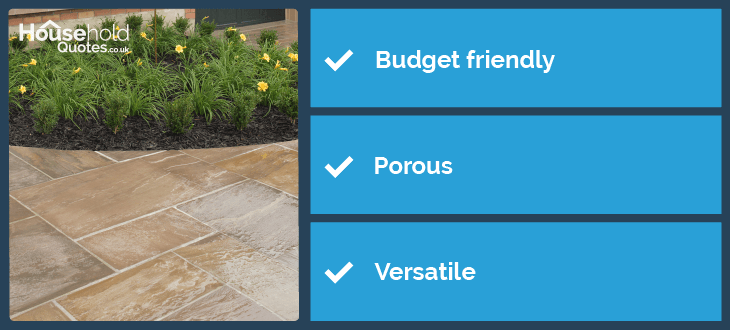
Indian sandstone is a natural material that can create a unique finish for your driveway. It is formed from quartz that has merged over many years, resulting in each Indian stone's distinct colour. Despite its unique qualities, this material is surprisingly affordable due to its abundance in supply. On average, the cost for a 30m2 driveway ranges from £1,860 to £3,150.
Indian sandstone comes in various grades, from premium to budget options, which depend on colour, texture, and quality. Budget-friendly grades may have more variations or imperfections but are still suitable for many landscaping and construction projects.
The wide range of colours available allows creative freedom in your driveway design. The soft stone can also be cut into different shapes, enabling various laying patterns, including random, linear, or geometric arrangements. This material also allows for creating custom designs, borders, and insets using different sizes and shapes of sandstone pavers or slabs to achieve the desired aesthetic.
Indian sandstone is a natural product that is naturally porous, providing excellent drainage for your driveway. However, being a soft, smooth stone, it can become quite slippery in wetter climates, posing a risk of falls and making it difficult for people with mobility aids to navigate.
It is also one of the least durable driveway materials; over time, it can become susceptible to weathering due to harsh summers or winters, leading to discolouration and surface deterioration.
Even if you live in a location not prone to harsh weather conditions, Indian sandstone may erode over time due to foot traffic, vehicle tyres, and weathering.
This can result in the formation of pits, grooves, or uneven surfaces, detracting from the driveway's aesthetic appeal and functionality.
Cobblestone
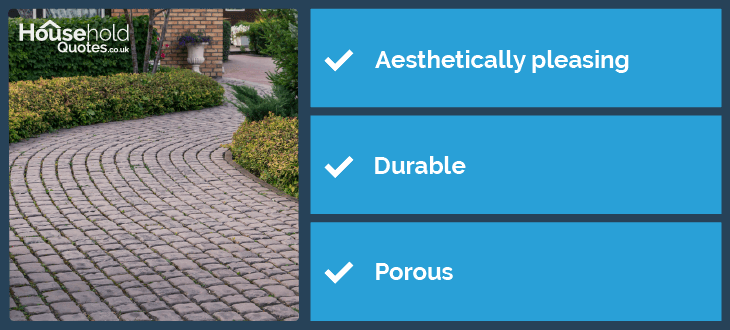
Cobble driveways are made from natural stones like granite, basalt, or limestone and set in sand or mortar. They bring a traditional and timeless look to your home and have been used for centuries for their beauty and durability. They have proven to stand the test of time in the UK, with an average lifespan of 25 to 60 years, provided they receive regular maintenance.
Cobblestones are laid in a tightly interlocking pattern, with each stone fitting snugly against its neighbours. This interlocking design creates a stable and cohesive surface that distributes weight evenly and minimises movement or shifting of the stones. As a result, cobblestone driveways can withstand the stress and pressure exerted by vehicles without cracking or deteriorating.
These permeable driveways allow water to drain through the gaps between the stones. This promotes better drainage, reduces the risk of surface runoff and flooding, and helps prevent erosion and water damage to the driveway.
The driveway cobblestone prices are less cost-effective than other driveway materials such as concrete or asphalt. While its a cheap driveway material, the complex design of cobblestone driveways means that the installation takes longer, resulting in higher labour costs. On average you will spend around £100 per m2 for a cobblestone driveway, making it the most expensive driveway material available.
One of the most challenging aspects of a cobblestone driveway is its uneven surface. The significant gaps make walking difficult, leading to severe falls during icy months. Furthermore, the gaps pose a problem for maintenance: debris and other dirt can get trapped and be challenging to remove. Additionally, weeds tend to grow through these gaps. While cobblestones provide a beautiful, traditional look to your home, you must be willing to deal with the uneven surface and difficult upkeep of this driveway material.
Types of driveways, planning permission and regulations
Many driveway materials fall under permitted planning in the UK. Permitted development rights allow you to make certain types of minor alterations or extensions to their properties without the need to apply for planning permission, including driveways.
However, planning permission may be required depending on factors such as the type of driveway material, the size of the driveway, and the property's location in a designated area like a conservation area or near a listed building. Here are some common types of driveway materials that may require planning permission in the UK.
- Non-Porous Materials: Driveways made from non-porous materials such as concrete, conventional asphalt, or resin bonded driveways may require planning permission if the surface area exceeds the threshold of 5m2. This is because non-porous materials can increase surface water runoff, potentially contributing to flooding or drainage issues.
- Listed Buildings or Conservation Areas: Homes located within conservation areas or adjacent to listed buildings are subject to additional planning restrictions and may require permission for driveway alterations or new installations. Local authorities may have strict guidelines to protect these areas' historic or architectural character, including restrictions on the choice of materials and design features.
Choosing a suitable driveway material is a crucial decision that can significantly enhance your home's curb appeal and functionality. By understanding the characteristics and pros and cons of different driveway materials and types, you can make an informed decision that aligns with your style preferences, budget, and long-term needs.
It's crucial to consult with a driveway specialist to determine if your driveway complies with permitted planning regulations and to explore potential solutions if a planning permit is needed. However, finding a driveway specialist can be a daunting task.
We recommend using our service at Household Quotes to obtain four free quotes from different suppliers. By clicking below, you can eliminate the hassle and worry of finding a reputable contractor – we'll handle the work for you.
- Describe your needs
- Get free quotes
- Choose the best offer
It only takes 30 seconds

FAQ
The best type of driveway depends on your preferences and needs, such as maintenance, budget, accessibility, and your current weather climate. However, asphalt is the most popular driveway material in the UK due to its durability, lifespan, and cost-effectiveness.
Concrete is considered the most durable type of driveway available. It is inherently strong and can support the weight of vehicles without cracking or tearing.
The most expensive type of driveway is cobblestone. While the materials themselves are relatively cost-effective, the labour involved is intense and time-consuming due to the interlocking nature of the cobblestones. This results in an average cost of £100 per m2.
The cheapest driveway option is gravel, as materials and labour are relatively budget-friendly. It is easy to install and there is an abundant supply available, making it one of the most cost-effective driveway materials.

Caoimhe is an experienced content writer and researcher who is passionate about providing accessible information to every reader. With a background in English literature and Sociology, she combines the two disciplines to create cohesive, well-thought-out, and well-informed pieces.
